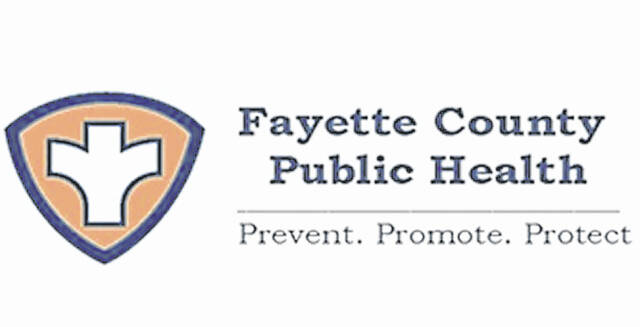
Fayette County continues to experience a high level of community transmission of COVID-19 per the Centers for Disease Control and Prevention (CDC). In areas with substantial and high transmission, CDC recommends that everyone (including fully vaccinated individuals) wear a mask in public indoor settings to help prevent the spread of Delta and protect others.
There have been a total of 4,940 cases reported in Fayette County (3,769 confirmed, 1,171 probable) since the pandemic began. The total number of hospitalizations is 376. There have been a total of 72 deaths, and 4,501 individuals are presumed recovered. (Presumed recovered is defined as cases with a symptom onset at or above 21 days prior who are not deceased).
Omicron variant
Omicron is a new variant of the virus that causes COVID-19. The Omicron variant has been detected in a growing number of countries, including the U.S.
Studies are underway to determine if current vaccines are effective against this variant. While it is possible that current vaccines may be less effective against the Omicron variant, vaccine availability is limited in many African countries, and South African officials are reporting that most of the people there who are sick due to the Omicron variant were not vaccinated. Vaccines remain widely available in the U.S. and the Omicron variant is yet another reason to get vaccinated and get a booster if you are eligible.
Health officials are also collecting data to determine whether Omicron is as serious a health risk as other variants. In the meantime, it is important to remember that any coronavirus infection can be life-threatening especially in people with underlying medical conditions. The best way to prevent the spread of this new variant or any other variant is to get vaccinated, get a booster if you are eligible, and to wear a mask in indoor public settings or in a crowded environment. In most places, masking is also required for air, train and bus travel and other forms of public transportation.
Travelers should continue to follow CDC guidance for traveling, along with state and local travel return requirements. After a trip, travelers are recommended to self-monitor for COVID-19 symptoms; and isolate and get tested if you develop symptoms.
If you plan to travel internationally, you will need to get a COVID-19 viral test (regardless of vaccination status) before you travel by air into the U.S. and show your negative result to the airline before boarding. The CDC recommends that all travelers returning from international travel get tested for COVID-19 3-5 days after travel.
If you are not fully vaccinated, the CDC also recommends that you get tested for COVID-19 3-5 days after returning from travel (domestic or international), and to stay home and self-quarantine for 7 days after travel. If you don’t get tested, stay home and self-quarantine for 10 days after travel.
Vaccine Booster Doses
Everyone age 18 and older should get a COVID-19 booster dose. The CDC advises that people who are 18 or older who received the Moderna and Pfizer vaccine should get a booster at least six months after their second shot. Johnson & Johnson recipients who are 18 and older should get a booster at least two months after their initial shot. At this time, a booster is not recommended for children who are 5 to 17 years old.
The CDC’s latest guidance advises people to get the same booster as their initial vaccine, but allows people to mix and match (i.e., get a different COVID-19 booster than their initial vaccine) depending on preference or availability. If you have questions about your eligibility for booster doses or which booster you should get, speak to your health care provider.
The vaccines work. The COVID-19 vaccines continue to be highly effective in reducing risk of severe disease, hospitalization, and death. CDC data show that in August 2021, the risk of dying from COVID-19 in the U.S. was more than 11 times greater for unvaccinated people than for fully vaccinated people. However, scientists are starting to see reduced protection against mild and moderate disease, especially among certain populations. CDC’s latest guidance is in response to this waning of the efficacy and the recent emergence of the Omicron variant.
Vaccination Clinics
Appointments are required for all FCPH vaccination clinics. Please bring your COVID Vaccination Record if you have already received at least one dose and your health insurance card if you are getting a flu shot. Masks are required.
FCPH OFFICE –
Pfizer/Comirnaty – Dec. 10, 17 – 9 a.m. – 4 p.m.
Moderna – Dec. 6, 13 – 9 a.m. – 4 p.m.
Johnson & Johnson (Janssen) – Dec. 8, 15 – 9 a.m. – 4 p.m.
All three COVID-19 vaccines will be available on Wednesday, Dec. 29 from 9 a.m. – 3 p.m.
FAYETTE COUNTY FAIRGROUNDS – All three COVID-19 vaccines, flu and high-dose flu will be available. The health department office will be closed on these dates so that staff can work offsite at the clinic.
Tuesday, Dec. 7, 11 a.m. – 7p.m.
Tuesday, Dec. 14, 9 a.m. – 3 p.m.
Tuesday, Dec. 21, 11 a.m. – 7 p.m.
For more information on vaccination clinic dates, visit faycohd.org/events or call 740-335-5910.


